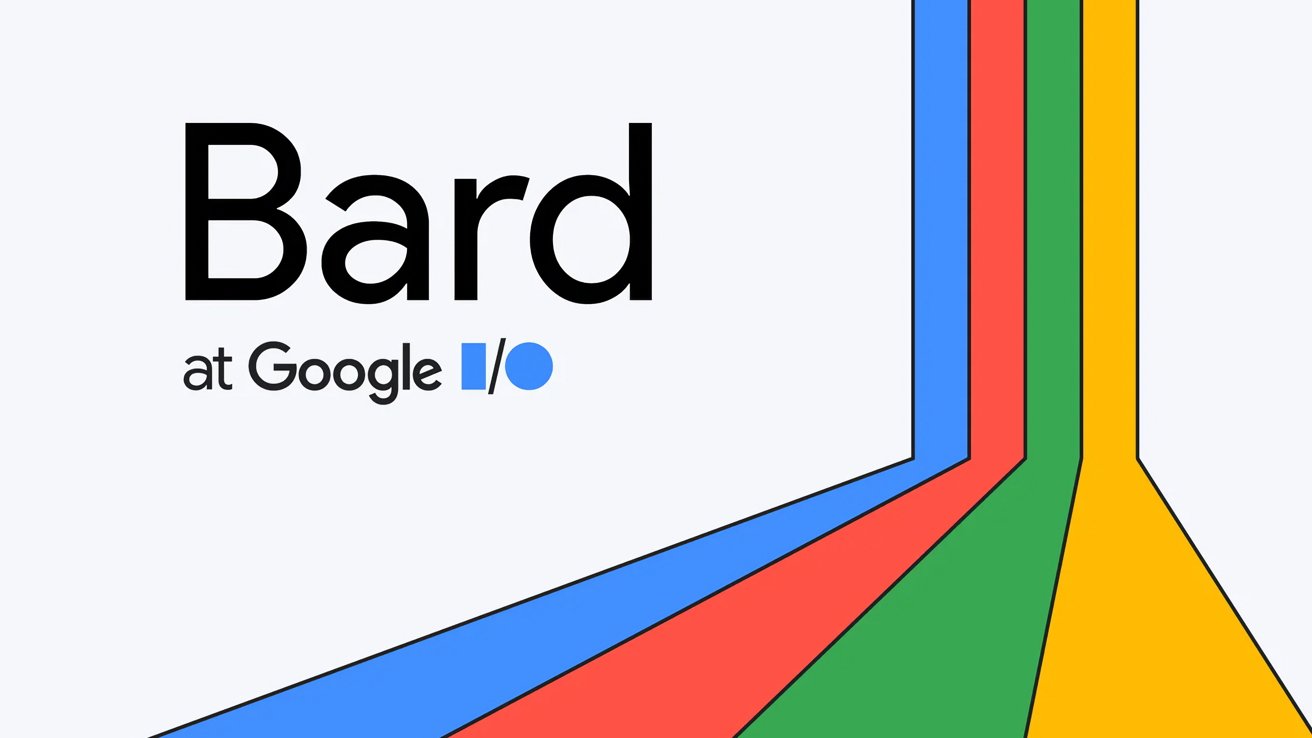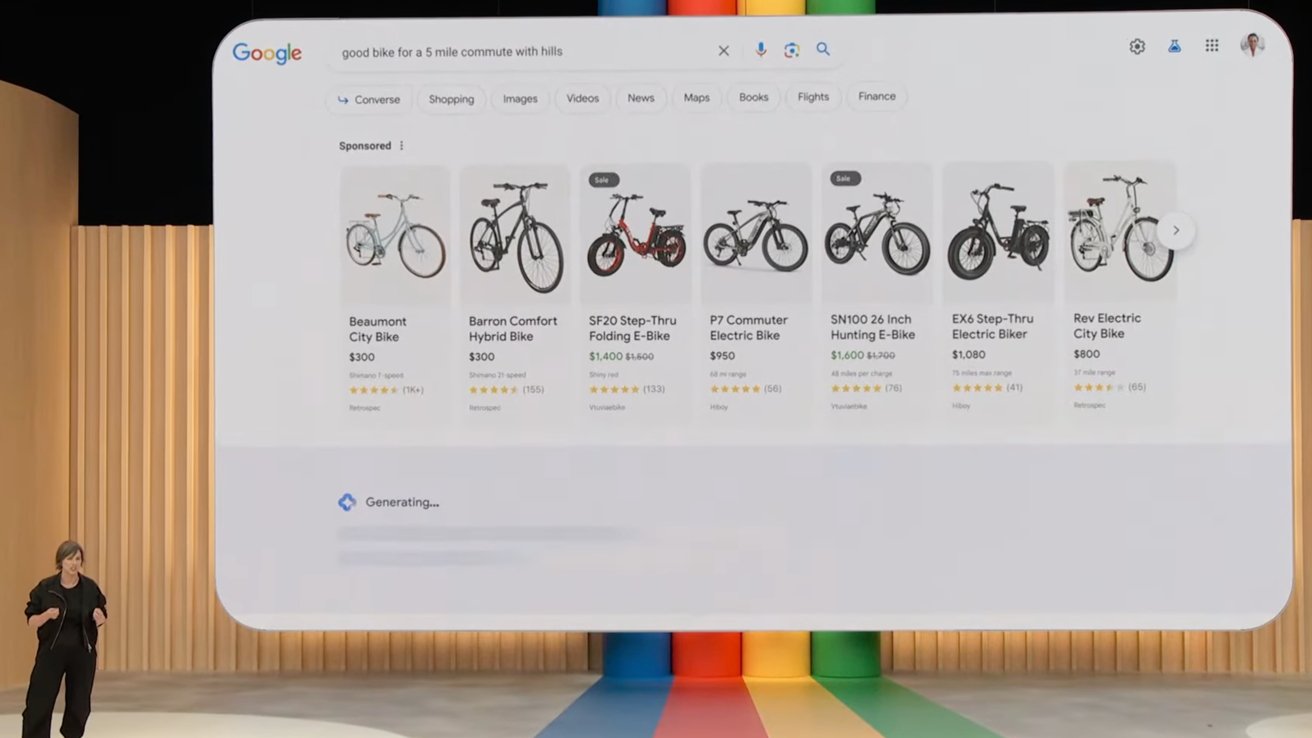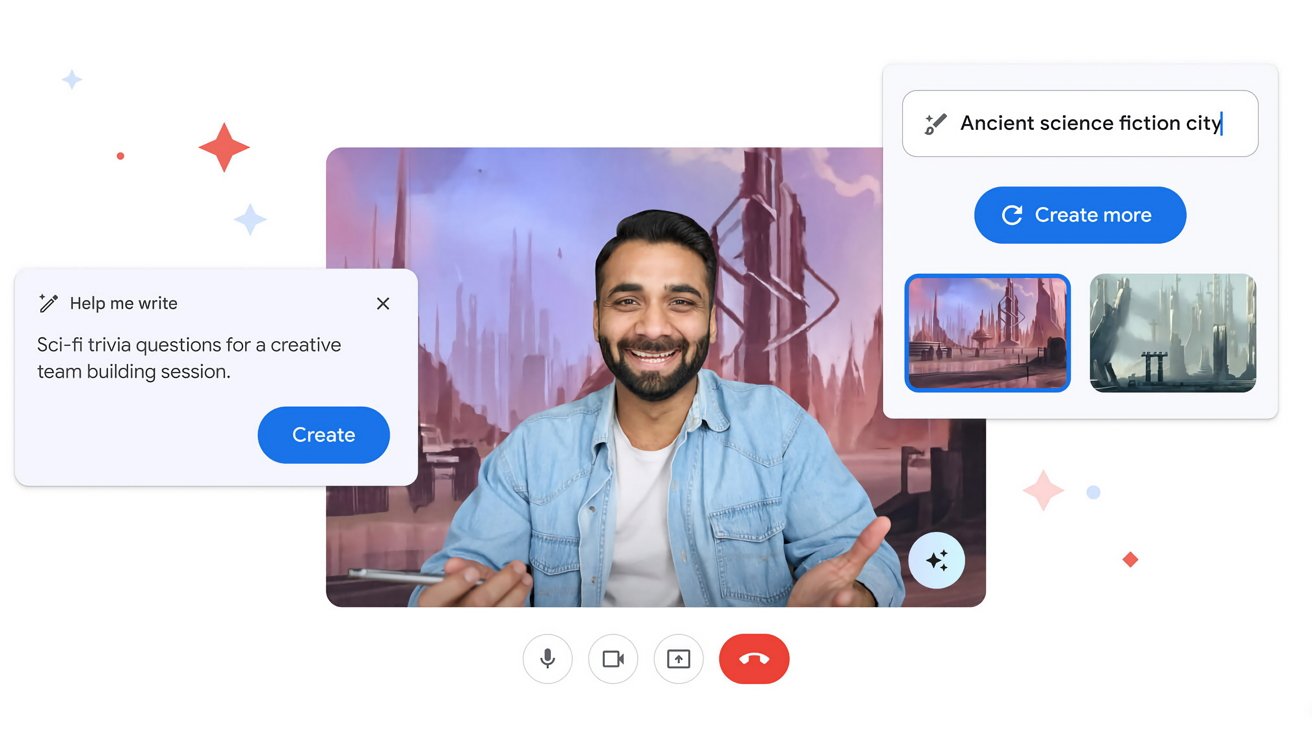Google doubles down on its 'AI' future during I/O, hitting the buzzword over 100 times
It took only 17 seconds for Google to say "AI" in its Google I/O keynote conference for the first time on Wednesday, and we stopped counting at over 100. Here are all the AI tools that it announced at the event, spanning nearly every product category it has.

Get the memories you want with Google 'AI' photo editing
Generative pre-trained transformer (GPT) or large language model (LLM) are terms being thrown around as buzzwords, but the most popular one of all is Artificial Intelligence (AI). It's such an important term for investors and stock market pundits that Google said the phrase "AI" over 100 times during its 2-hour Google I/O keynote.
Google said it shared AI-related updates across fifteen of its major product lines. We won't debate exactly what AI means for Google, but here's everything AI and AI-adjacent announced at the keynote.
{"@context":"https://schema.org/","@type":"VideoObject","name":"A look at what's next for AI and Google Search | Google I/O 2023","description":"For over a decade, AI has been behind the evolution of Search. This is a glimpse at how generative AI will further evolve Search in the coming months. This new Search Generative Experience, also known as SGE, will be rolling out via our Search Labs program: https://g.co/Labs. Starting today, if you're in the US, you can join the waitlist by tapping the Labs icon in the latest version of the Google app or Chrome desktop.","thumbnailUrl":"https://i.ytimg.com/vi/dVsiusLQy5Q/sddefault.jpg","uploadDate":"2023-05-10T19:08:00Z","duration":"PT1M33S","embedUrl":" "}
"}

Google Bard gets more AI improvements

Enhanced search with generative responses

Don't worry, Google's 'AI' is here to help with everything
Google also announced it would expand its mission statement of "Organize the world's information and make it universally accessible and useful" with AI. "Making AI helpful for everyone" will advance that mission.
It seems for Google, that "AI" refers to any computational tool that relies on large models trained on extensive data sets. It is an evolution of machine learning with the power of Google's collected data sets.
These updates come on the heels of OpenAI's partnership with Microsoft Bing. The major tech players are moving fast for control of the future of "AI," all except Apple, notably.
Apple's Worldwide Developer Conference is being held in June. While the company will likely avoid using buzzwords like "AI," it will be very surprising if some level of large language model or transformer isn't announced for Apple users with a privacy angle.
Read on AppleInsider

Get the memories you want with Google 'AI' photo editing
Generative pre-trained transformer (GPT) or large language model (LLM) are terms being thrown around as buzzwords, but the most popular one of all is Artificial Intelligence (AI). It's such an important term for investors and stock market pundits that Google said the phrase "AI" over 100 times during its 2-hour Google I/O keynote.
Google said it shared AI-related updates across fifteen of its major product lines. We won't debate exactly what AI means for Google, but here's everything AI and AI-adjacent announced at the keynote.
{"@context":"https://schema.org/","@type":"VideoObject","name":"A look at what's next for AI and Google Search | Google I/O 2023","description":"For over a decade, AI has been behind the evolution of Search. This is a glimpse at how generative AI will further evolve Search in the coming months. This new Search Generative Experience, also known as SGE, will be rolling out via our Search Labs program: https://g.co/Labs. Starting today, if you're in the US, you can join the waitlist by tapping the Labs icon in the latest version of the Google app or Chrome desktop.","thumbnailUrl":"https://i.ytimg.com/vi/dVsiusLQy5Q/sddefault.jpg","uploadDate":"2023-05-10T19:08:00Z","duration":"PT1M33S","embedUrl":"
 "}
"}
Google app and Android AI updates coming in 2023
- Help Me Write: get help writing an email using context clues within an email thread.
- Help Me Write will also appear across Google Workspace apps. Ask for a detailed job description in Docs, a pet roster for a dog walking job in Sheets, or spice up a Slides doc with generated images.
- Other Help Me Write examples showed a prompt helping with writing a fictional story, planning a potluck in a Gmail thread, or generating speaker notes for a slideshow.
- Google Maps Immersive View for Routes: get a 3D preview of a route using stitched-together mapping data. Coming to 15 cities by the end of 2023.
- Google Photos Magic Editor: take control of photos by editing out objects, moving pieces, or even adding in details of objects that didn't exist in the original photo.
- Generate emoji wallpapers, cinematic wallpapers, or original AI art with generative AI.
- Pixel Call Assist continues to evolve with tools that filter unwanted calls, show phone tree prompts as touch targets, or improve call quality.

Google Bard gets more AI improvements
Bard
- Coders can prompt PaLM 2 powered chatbots like Bard with queries around code and ask for notes in different languages.
- Bard has learned over 20 coding languages and can help with code generation, debugging, and explanation.
- Generated code can be fine-tuned with further queries to Bard and even exported to systems like Replit.
- Bard can export responses to Gmail or Google Docs. Available now.
- Bard is gaining "tools," or API access to Google's first-party apps and third-party systems. One example showed Bard creating an image caption using Google Lens.
- Bard can also serve as a powerful search tool. An example had Bard explain what classes a person would take with select interests, then showed colleges with those courses nearby on Google Maps. That data could then be transformed into a table and exported into Google Sheets.
- Bard tools will come from many popular services, one shown by Adobe Firefly. Generate images with a prompt using license-free training data.

Enhanced search with generative responses
Google Search
- Google Search shows an "AI-powered snapshot" built from search queries. It is shown as a clearly separate area with a green highlight.
- Search will also be improved thanks to information from Google's shopping data, scraped info from the web like review content, and more. Give Google a prompt for needing an e-bike for a city commute in a price range, and it'll use AI to generate the response.
- Tune Google Search results with follow-up queries.
- Google Search with AI tools is an expansive experience that can help with nearly any query. Google pushed its global dominance in Search as a powerful backend for expanding LLMs and AI.
Google Cloud and business
- Many of the AI tools and prompt integrations are also coming to Google Cloud. Businesses can take advantage of Google's large models when it rolls out later.
- Project Tailwind will allow Google Cloud users to provide troves of personal notes and data to feed PaLM 2. This will enable a personalized chatbot that knows what you're working on and output the data you've given as useful snippets.
- A universal translator tool will provide users the ability to translate a video into any language and make the speaker's lips match up with the words.

Don't worry, Google's 'AI' is here to help with everything
Google also announced it would expand its mission statement of "Organize the world's information and make it universally accessible and useful" with AI. "Making AI helpful for everyone" will advance that mission.
It seems for Google, that "AI" refers to any computational tool that relies on large models trained on extensive data sets. It is an evolution of machine learning with the power of Google's collected data sets.
These updates come on the heels of OpenAI's partnership with Microsoft Bing. The major tech players are moving fast for control of the future of "AI," all except Apple, notably.
Apple's Worldwide Developer Conference is being held in June. While the company will likely avoid using buzzwords like "AI," it will be very surprising if some level of large language model or transformer isn't announced for Apple users with a privacy angle.
Read on AppleInsider


Comments
en.wikipedia.org/wiki/Surveillance_capitalism
As Zuboff asks once one slides down the rabbit hole can there be any retreat to meaningful purpose or relationship with customers...?
Do critics who have not dutifully considered Zuboff's highly researched and documented tome have any credibility in reply...?
Has Apple under Mr. Cook bet the farm, and yet (as identified early in the book) has a truly meaningful and positive alternative that 'even Apple may not have recognized' been missed...?
It remains to be seen if that applies in this case, but I think the GPT approach is still in the very early stages and needs time to be properly evaluated.
But a techco like google, which has had deepmind and other AI/ML stuff for literal decades should absolutely be on the forefront and setting the trend, and not be upstaged by a startup with far less resources. This is a colossal failure of Sundar Pichai.
Once these buzzwords and acronyms take hold you just have to grin and bear it, try not to laugh, and chalk it up to herd mentality. Thankfully some of them die off over time but are soon replaced by new buzzwords and acronyms striving to find their place in the world. Technology related businesses are especially fertile ground for hatching new buzzwords and acronyms to expand the vocabulary of the buzzspeak language. There are many different domain specific dialects of buzzspeak, with the military having some especially salty ones.
Buzzwords and acronyms are effectively a written and spoken equivalent to emojis. They are tiny packages that are meant to convey a lot more than the buzzword itself, just like a poop emoji conveys a certain meaning. Right now we’re seeing that merely associating oneself with “AI” implies a step change in new capability and technological superiority, regardless of how it’s actually implemented and delivered in a consumable form.
Like anything buzzwordy we always need to look behind the the buzzwords and delve into what it really means. In the case of AI it can mean many things. Is it a useful tool or is it a dangerous weapon? Probably both, depending on whose hands it’s in and how it’s being used. Unfortunately we’re at a point where we don’t really know because we haven’t fully unpacked what is behind the AI buzzword that’s being thrown around with increasing frequency.
I certainly don't expect Google to throw caution to the wind now and release all they could. I hope they continue to be careful and responsible as this new tech is introduced.
EDIT: A pertinent article that pops up in a search. There are others.
https://www.wsj.com/articles/google-ai-chatbot-bard-chatgpt-rival-bing-a4c2d2ad
1. Work themselves into knots wishing to go back to the 'good old days', which won't happen, resulting in further frustration and anxiety
2. Understand that this is the 'new normal', and adapt to it. Heck, maybe find ways to benefit from it.
Understand that money can't buy you more life, and that mindlessly pursuing it at the expense of others/humanity (e.g. slavery/forced labour, exploitation, creating things to manipulate people into thoughts/actions which have a negative impact on the world) is simply making the impact of the time you have in your life a net negative. As measured by things like the knowledge/wisdom contributed to future generations, increased quality of life for future generations, freedom and inclusion gained by more people, etc.
And yes, I do think that AI could contribute to things which fall into those measurements (as I do with technology in general), but not when it's purely being used to drum up investment dollars (and those investors mindlessly trying to jump on anything for quick profit). Investment is certainly necessary, but in areas which are truly going to benefit humanity, and not lead us down the path of losing all the things we've gained up to this point in our history.